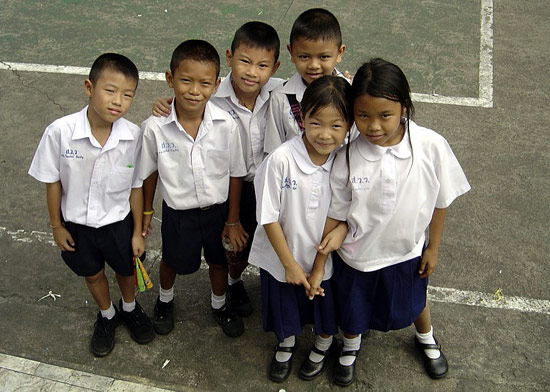Life Stages: Childhood
Thai parents often make sacrifices to provide the best possible resources for their children. Young children remain close to their parents, particularly the mother, until they are weaned.
Young Thai children usually receive a lot of attention from their parents and other relatives. Families usually encourage curiosity, and they also emphasize respect for elders from an early age. Although parents are the primary caretakers of their children, it is common for grandparents to become care providers if the parents are working, become ill, or have migrated to find work.
Children symbolize a stable union. Thais value both male and female children, but there is some preference for boys. Traditionally, sons are valued for the merit they can bring their parents when they are ordained as monks, and daughters are valued as potential caregivers for elderly parents.
School and Work
Some Thai children start preschool at 3, but most begin their education at 6. School is free and compulsory for children ages 6 to 14 and continues to be free for young people up to 18 years of age. Almost all Thai children complete sixth grade, and most go on to secondary school. In their spare time, most Thai children play games or sports. Many have small chores around the house.
Children in rural Thailand often stop going to school after completing the nine-year compulsory education to work and help their families.
Labor laws in Thailand prohibit employment of children less than 15 years of age, but these laws apply only in the formal sector and do not cover younger children working in agriculture or as domestics. Street children also do odd jobs in large cities. About 4 percent of children between the ages of 6 and 14 works in the service sector, including jobs in gasoline stations, small-scale industry, and restaurants.
Copyright © 1993—2025 World Trade Press. All rights reserved.

 Thailand
Thailand 